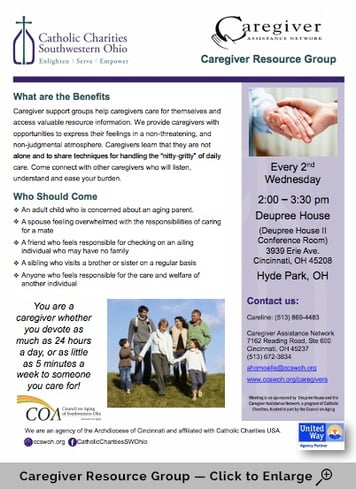
For better, for poorer, in sickness and in health.
Those words are easy to repeat and to mean when partners are young and in good health. But what about later, when age-related conditions catch up with us? What happens when your life together, enjoying your retirement years as active, independent seniors, changes in a heartbeat?
We see it here at Deupree House, and at our Episcopal Retirement Services communities, all the time.
Sudden health changes can leave one spouse or partner — more often, a woman — caregiving full-time for the other, which can in turn strain relationships.
“Caregiving often changes the dynamics between partners — from sharing the joys of living and planning a brighter future to merely surviving the numbing drudgery of daily care tasks,” noted AARP contributor Barry Jacobs. “Some of the passion and friendship may go out of the relationship; sadness or even mutual resentment can creep in.”
But caregiving doesn’t have to be a burden. If you suddenly find yourself caregiving for your partner, there are resources — community-based and otherwise — that can help you shoulder the load.
Here are some tips for coping with the change.
1. Ask for help
No, you don’t have to go it alone.
Partners who love each other would do anything to keep each other from feeling miserable. No one — especially not a spouse who loves you — expects you to completely sacrifice your own health, happiness and wellbeing.
And that’s especially true if you’re still working. You can’t juggle your job, sole management of the household and provide full-time care. It’s impossible for anyone to manage.
You might enroll your partner in adult day care services, which allow you to work, or just to take some much-needed time for yourself.
You might arrange for your spouse to be admitted for temporary respite care at a retirement home, so that you can have a few days or weeks to recharge.
 You might sign up for Meals On Wheels deliveries for your spouse during your work or personal hours, bring a care manager onboard to help you coordinate services and monitor your partner’s health, or ask your children for rotating help in with some of care duties.
You might sign up for Meals On Wheels deliveries for your spouse during your work or personal hours, bring a care manager onboard to help you coordinate services and monitor your partner’s health, or ask your children for rotating help in with some of care duties.
It’s not weak or selfish to reach out for assistance. By spreading the workload out over the family and community-based resources, you’ll probably end up providing better care anyway. You won’t feel exhausted all the time, you’ll be more focused, and you’ll avoid feeling resentment.
2. Accept that, no matter how much you do, there is no cure
Degenerative conditions like Alzheimer’s disease or dementia don’t reverse with more care. With memory care intervention, the progression of dementia might slow, but ultimately, the outcome is certain.
It’s easy to lose yourself in caring for a spouse with a degenerative condition. But it’s important to bear in mind that, no matter how much time and work you pour into it, your partner will never be the same as he or she was.
3. Allow yourself to acknowledge that just remaining emotionally available to your partner is a form of care.
“Though the brain tumor caused physical disability and some cognitive issues, he was still my husband,” caregiver Traci Horton Boland told The Caregiver Space. ”Even after his disability, he was still my life partner, the father of my children, the avid woodworker who took care of everything around the house and so much more.”
“The single greatest thing anyone could have done for him throughout his disability and hospice was spend time with him like he still mattered,” she wrote.
Not everyone can handle the physical burden of caregiving over the whole course of a spouse’s illness. Many opt for skilled nursing placement.
That’s not “giving in.” It’s just a recognition that you can’t provide the level of care that your partner needs. And it doesn’t mean that your caregiving relationship is over, either.
What, then, is the remaining role of the caregiver?
Mostly, to provide comfort.
It’s to be emotionally available to your partner, and to allow your partner emotionally to support you, while others take the lead on looking out for his or her health needs.
If helping your partner with the tasks of daily living — cooking, bathing, dressing, toileting, medication monitoring — become too much for you to handle alone, it’s OK.
Caregivers need care, too. Instead of wishing negative feelings away, allow yourself to have them. Air them out. Talk to someone about how you’re feeling. Reach out to a friend, your spouse, another family member, or attend a caregiver support group. That’s what we’re here to help you with at Deupree House.












